 Time Warner Cable will continue to offer customers unlimited data plans and further expand its Maxx upgrade program until it reaches the company’s entire service area or the merger with Charter Communications is approved by regulators.
Time Warner Cable will continue to offer customers unlimited data plans and further expand its Maxx upgrade program until it reaches the company’s entire service area or the merger with Charter Communications is approved by regulators.
CEO Robert Marcus told investors on a morning conference call the company has been “completely committed to delivering an unlimited broadband offering in connection with whatever else we do, because we know customers do place a value on the peace of mind that comes with unlimited plans.”
Marcus continued to admit his company’s experiments with voluntary usage pricing have largely failed, noting the “vast majority” of customers choose unlimited plans, and Time Warner “never had any intention of substituting the availability of unlimited with exclusively usage-based programs.”
The original goal for Time Warner’s voluntary usage pricing options “was to offer customers who use less bandwidth, who maybe just do e-mail, an opportunity to pay less and have an Internet offering that better meets their demands for both usage and price.”
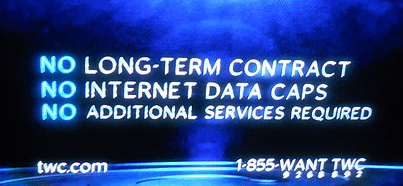
Time Warner Cable goes out of its way to advertise “No Data Caps.”
Most broadband customers do not want usage-based billing or usage-capped Internet, but some providers force such usage plans on customers anyway.
“Different providers have had different philosophies on these things,” Marcus offered.
Marcus reported TWC Maxx deployment in Austin is finished, and the company is working on completing upgrades in Dallas, San Antonio, Raleigh, Charlotte, Kansas City and Hawaii by year-end. The latest markets to be upgraded — San Diego, Wilmington and Greensboro, N.C., will start this year, but speed increases will not begin until next year. The upgrades are improving customer satisfaction with a 35% drop in voluntary disconnects in Maxx service areas, but will cost an estimated $4.45 billion in spending this year by the country’s second largest cable operator.
Time Warner Cable Maxx has been very successful at bringing new customers to Time Warner, attracted by improved broadband speeds and better service, Marcus told investors. Maxx customers see broadband speed upgrades that dramatically boost speeds at no additional cost. Standard Internet speeds in non-Maxx markets are 15Mbps. In Maxx areas, customers receive 50Mbps. Customers signed up for 50Mbps “Ultimate” Internet in Maxx markets see that speed raised to 300Mbps.
Large sections of Time Warner Cable territory have yet to be upgraded, however. Marcus today said he plans to continue the Maxx upgrade effort as the Charter merger proceeds through a lengthy regulatory review process. If the merger is delayed or unsuccessful, Time Warner likely will announce additional cities targeted for upgrades in 2016, but customers should not expect speed changes until later that year or 2017. If the Charter merger is approved, areas bypassed for Maxx upgrades will likely get a more modest upgrade promised by Charter, with maximum broadband speeds of 100Mbps.

Marcus
Time Warner Cable spent the last quarter pushing lower priced promotions to attract new and returning customers. That, combined with higher programming costs, increased spending on network upgrades, and pension expenses cut into the cable company’s profits, which declined 7.2% in the last quarter.
Time Warner Cable added 66,000 residential customers overall, its best ever second quarter and its first rise in any quarter since 2008, according to Marcus. Time Warner added 172,000 new broadband customers and 252,000 voice subscribers, primarily from a promotion that allows any subscriber to add phone service to their package for $10 a month. But Time Warner is not immune to cord cutting, and lost 45,000 video customers in the second quarter.
The cable company may have stepped up promotions to be certain it can report good results as investors wait for the Charter Communications merger to win or lose regulator approval. A triple play promotion for new customers runs as low as $89 a month and despite touting an earlier philosophy the company did not see much value promoting cheap phone service, it has apparently reversed course, boosting triple play upgrades as a result of reduced pricing.
It is also continuing strong customer retention policies, a sign Time Warner Cable will continue to respond when customers threaten to cancel unless they get a better deal.
“Our whole view of retention hasn’t really changed since the middle part of 2014,” said William F. Osbourn, Jr., acting co-chief financial officer. “Our view is that we will always rather save the customer than lose the customer, but I think we’re pretty disciplined about not giving away the farm in doing that.”
Some other highlights:
- Programming costs rose 11%, a sure bet another rate increase will be forthcoming in the future;
- Marcus loves mergers: “The only thing I’d add to that is that from an industry structure perspective, in roughly a quarter of our footprint, the deal [between AT&T and DirecTV] results in two competitors becoming one. And, generally speaking, that’s a positive for all the players in the industry”;
- Time Warner Cable will continue to encourage customers to use their own set-top box devices (Roku, Apple TV, etc.) as an alternative to the traditional cable set-top box;
- Roughly 12% of customers now own their own cable modems to escape Time Warner’s rental fee;
- Despite the clamor for “skinny bundles” 82% of Time Warner Cable customers subscribed to the full video package;
- In Maxx areas, customers need set-top boxes on all of their connected televisions. Most are opting for the cheapest option, taking an average of two less-capable DTA boxes instead of more expensive set-tops. DVR subscriber numbers have remain largely unchanged after Maxx upgrades.



 Subscribe
Subscribe Time Warner Cable is nearing the end of its $60 million “Maxx” upgrade of San Antonio, company officials said in a news release.
Time Warner Cable is nearing the end of its $60 million “Maxx” upgrade of San Antonio, company officials said in a news release.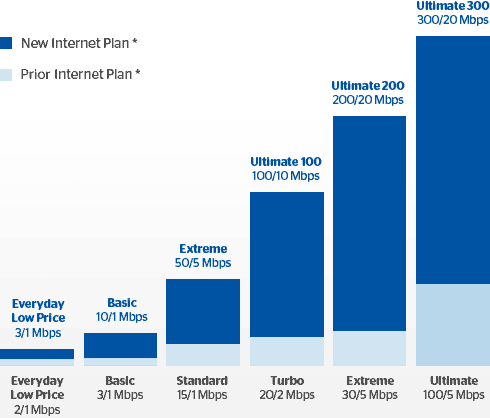
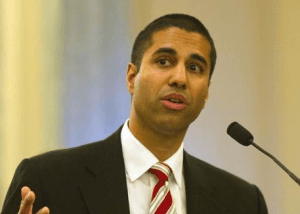

 Time Warner Cable will continue to offer customers unlimited data plans and further expand its Maxx upgrade program until it reaches the company’s entire service area or the merger with Charter Communications is approved by regulators.
Time Warner Cable will continue to offer customers unlimited data plans and further expand its Maxx upgrade program until it reaches the company’s entire service area or the merger with Charter Communications is approved by regulators.

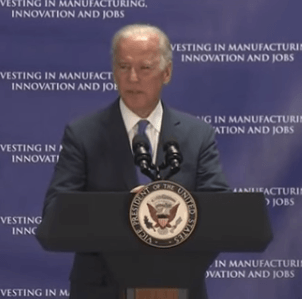
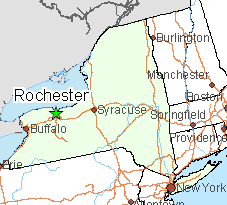 Despite the job shifts, the fact 24,000 workers in the region are already employed in photonics-related jobs may have been a deciding factor in selecting Rochester for the center.
Despite the job shifts, the fact 24,000 workers in the region are already employed in photonics-related jobs may have been a deciding factor in selecting Rochester for the center.
